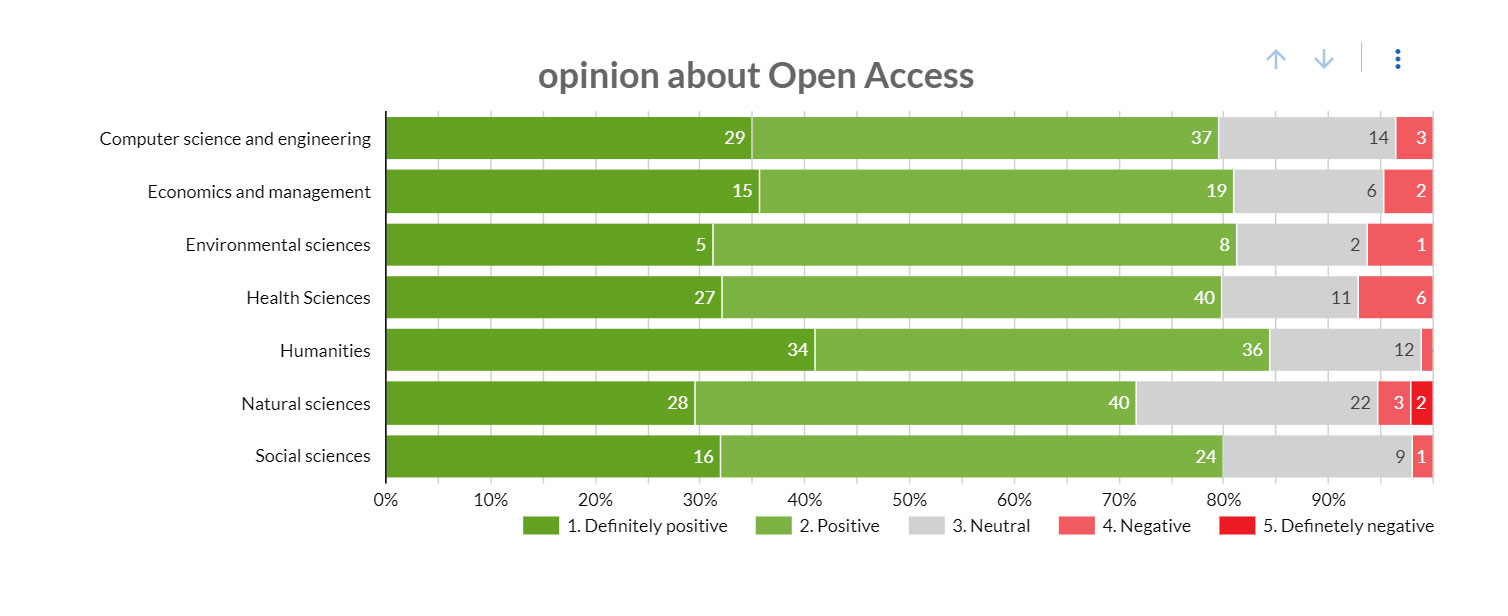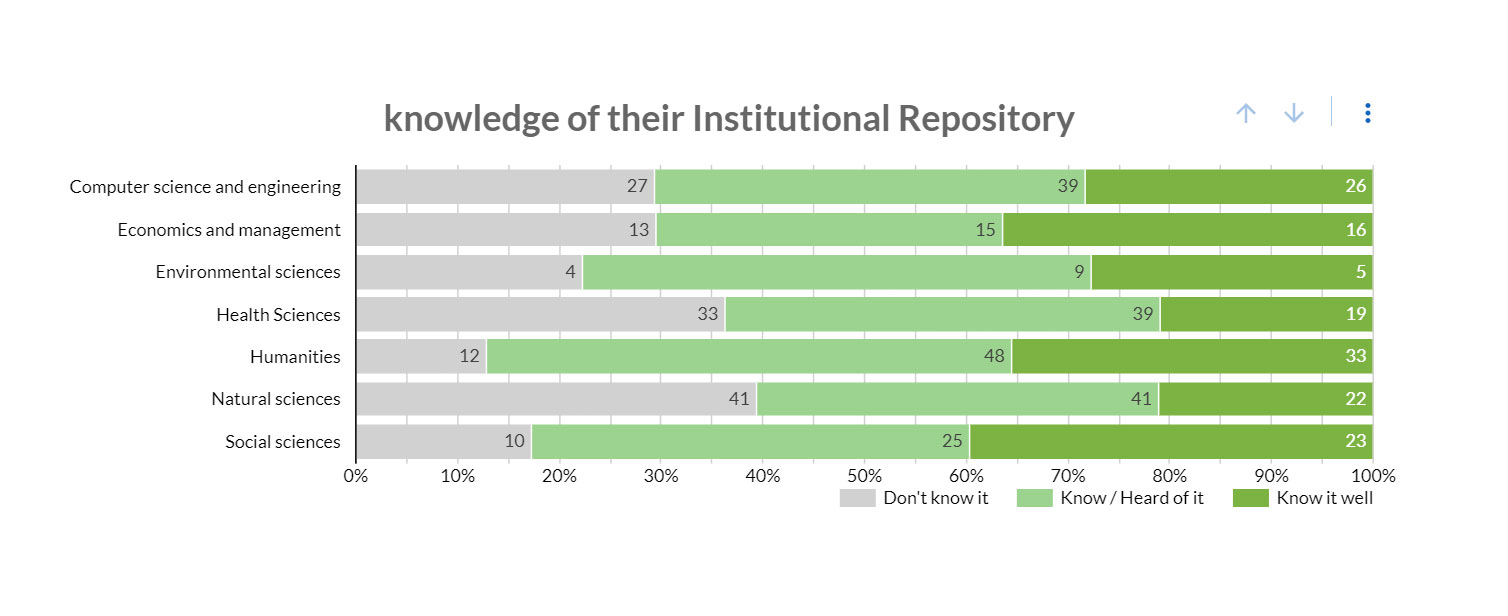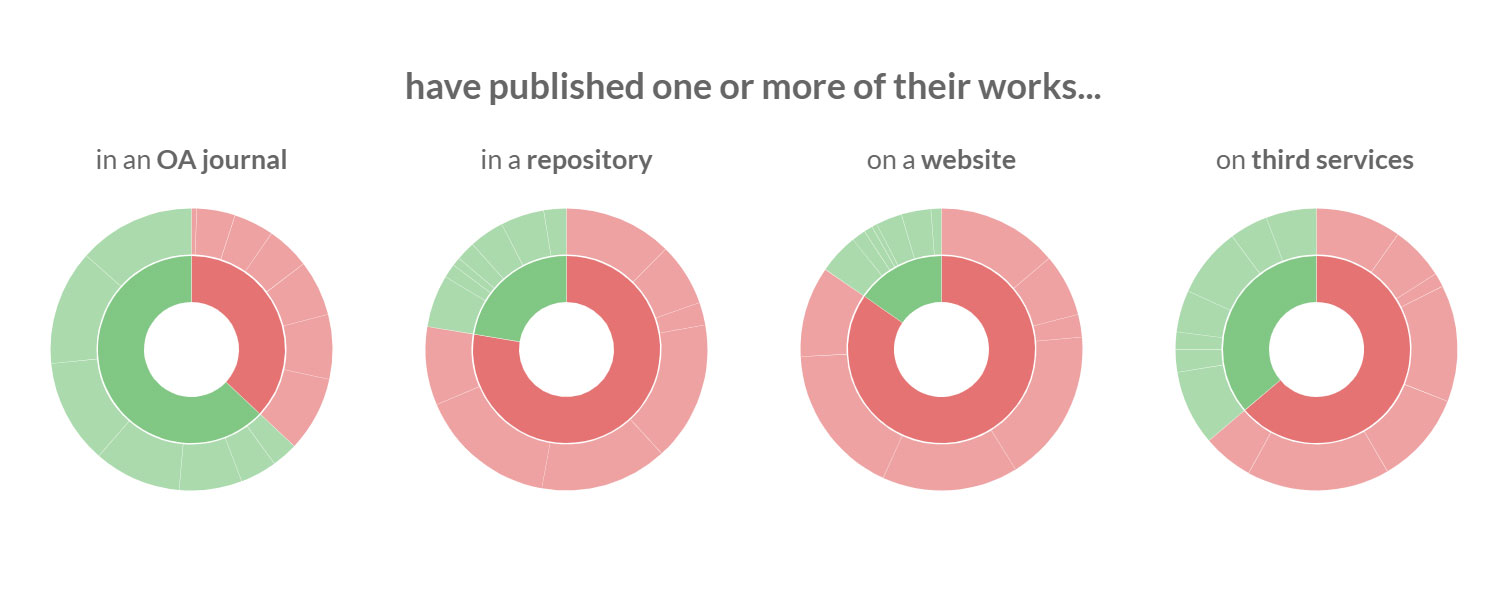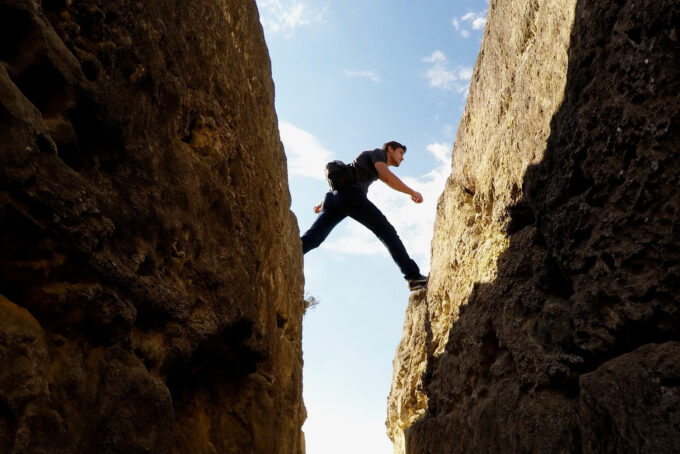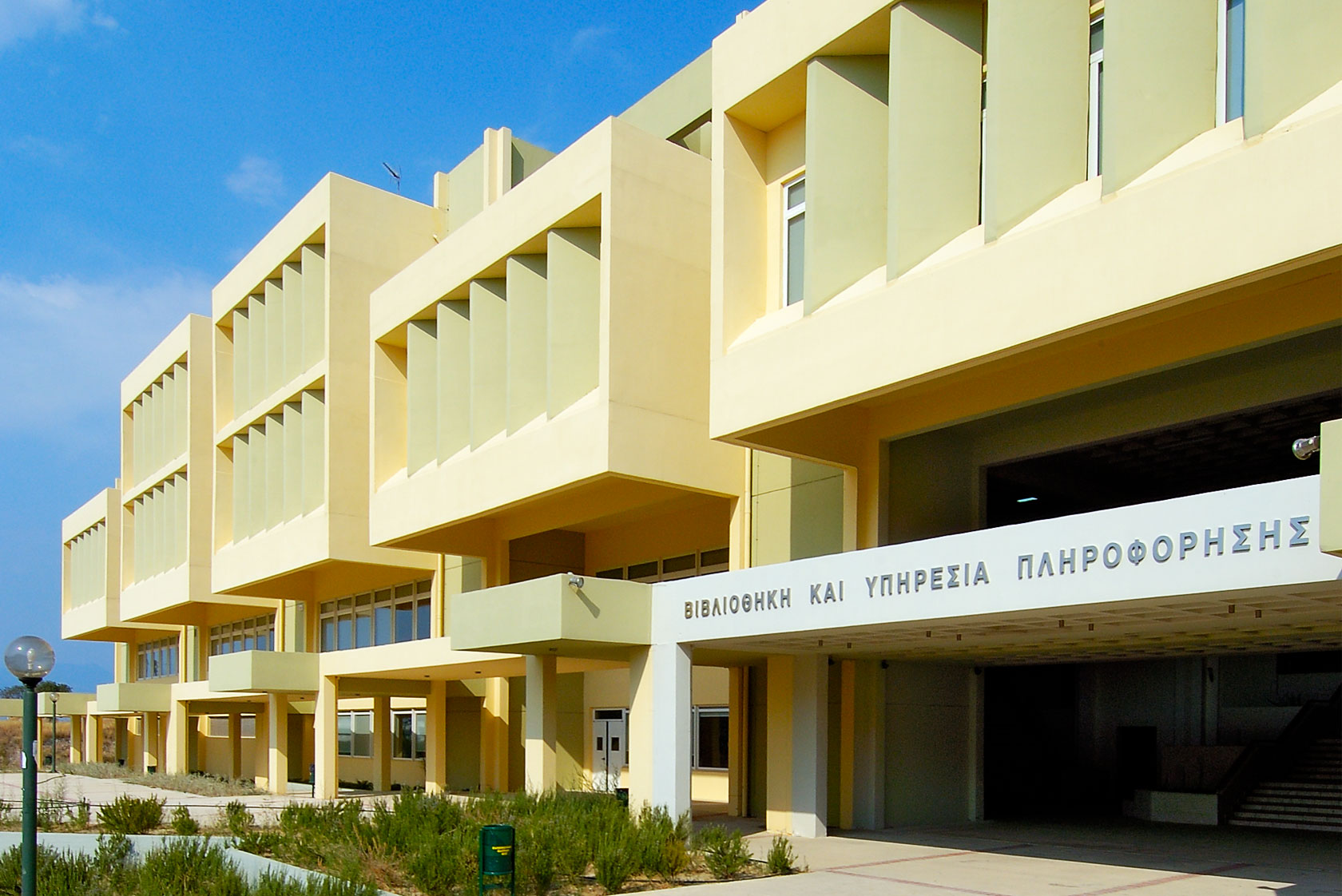
Open Access Survey in Greece: Status Quo, Surprising Findings and Starting Points
What is the state of Open Access in Greece? What are the biggest obstacles to Open Access publishing? And how much do researchers actually know about the various ways to publish Open Access? A nationwide survey with 500 researchers of different ages, from different disciplines and with different levels of professional experience addressed these questions.
An interview with Maria Frantzi, Athanasia Salamoura and Giannis Tsakonas
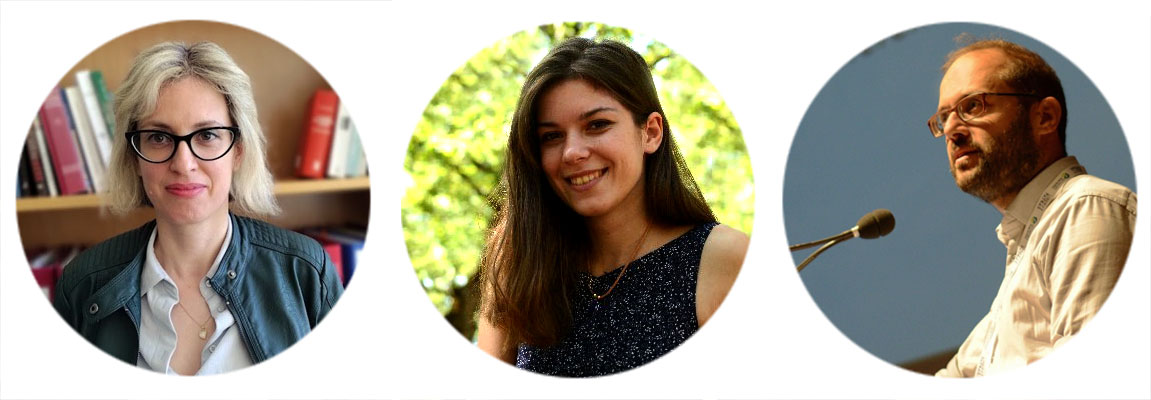
The representative nationwide survey on Open Access in Greece took place in March and April 2021. 500 authors from seven disciplines were surveyed. The subject areas were: Natural Sciences, Humanities, Computer Science and Engineering, Health Sciences, Economics and Management, Social Sciences and Environmental Sciences.
The researchers surveyed varied in age and career stage, with around 80% of respondents having a great deal of academic work experience (16 or more years). The survey asked respondents questions about their opinions and experiences with different aspects of Open Access and its implementation methods.
Staff from the Scholarly Communication Unit (EESC) of the Hellenic Academic Libraries Link (HEAL-Link) designed and analysed the survey. HEAL-Link is the national consortium of academic libraries in Greece.
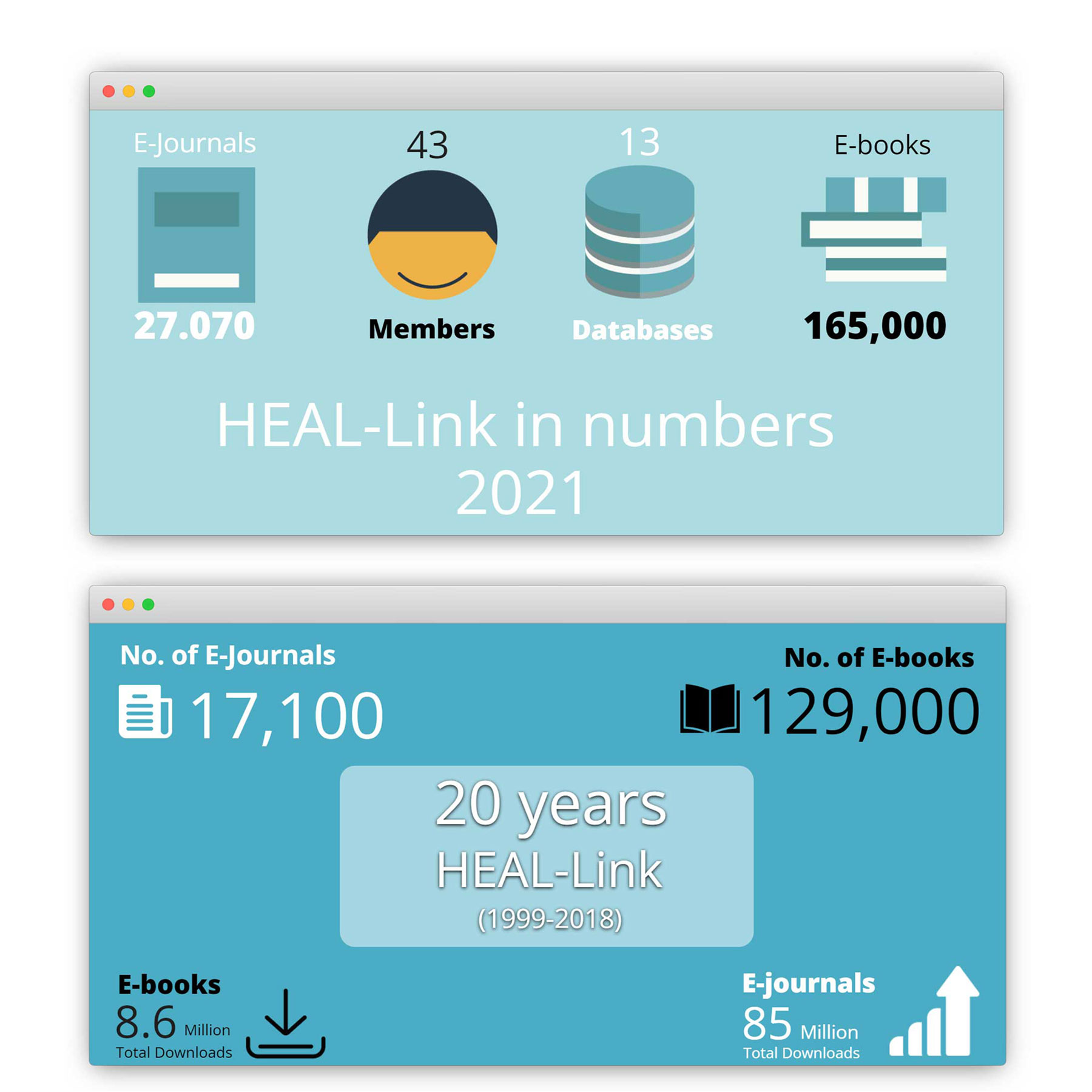
Hellenic Academic Libraries Link (HEAL-Link)
In the interview the team of EESC, namely Maria Frantzi, Athanasia Salamoura and Giannis Tsakonas, answer our questions about the background, results and consequences of the survey.
What is the state of Open Access in Greece?
Maria: In Greece there is no national mandate for Open Access though there are two Laws (4310/2014 and 4485/2017), which refer to the conditions of Open Access for publicly funded research and resources in education, research, technology, and culture. There is no Greek Research Funding Organisation (RFO) signatory of PlanS and, except HEAL-Link, there are no other centralised funds for OPEN ACCESS publications, but only a handful of institutional ones. The strong base of Social Sciences and Humanities (SSH) and the Greek language, has led to the development of a few platforms for diamond Open Access journals.
Guided by a declaration on Open Access, which was supported by the Ministry of Education, Research and Religious Affairs, in May 2018, HEAL-Link, which is the consortium of Greek academic libraries, has taken many initiatives to foster Open Access. This includes agreements with an Open Access element in most of the collaborating publishers, as well as community-led initiatives, such as Sponsoring Consortium for Open Access Publishing in Particle Physics (SCOAP³) and the Open Library for the Humanities (OLH). In March 2019, the Council of Rectors, as suggested by HEAL-Link, highly recommended to Universities‘ Senates a mandate for faculty and researchers to self-archive their scientific publications, but it hasn’t yet been implemented by the majority of the universities. Currently, except for two or three universities, all the institutional repositories have a mandatory policy for the deposit of theses and dissertations and a recommendation for the researchers’ and faculty publications. As a result, only one third of the Greek output seems to be published in Open Access with HEAL-Link being the only coordinated action.
What were the most surprising findings of the survey for you?
Athanasia: While the evidence that Maria mentioned is not very positive, it is encouraging to know that most of the researchers are aware of at least one Open Access route and that only a very small percentage has a negative opinion of Open Access.
Also, it’s interesting that only few of them publish in Open Access mode because it’s obligatory by their funding programme. If they have the resources, then they strongly consider opting for Open Access. A negatively surprising finding is that almost one third of the respondents said that they don’t know the repository of their institution although the institutional repositories (IRs) have been implemented for more than ten years.
Finally, we were surprised to see in the interviews that followed the survey, that some researchers consider other aspects of openness, such as Open Educational Resources, Open Source, etc., in tandem to Open Access publications.
How strong is the awareness of scientific authors for Open Access in Greece? On the other hand: To what extent has this type of publication already become established in practice?
Giannis: There is a high awareness among the Greek researchers of Open Access in general. However, through their replies we see that this type of publication has been only partly established in practice. Almost two thirds of the researchers mentioned that they have published in an Open Access journal, but then less than a quarter has published in a repository.
The pattern seems consistent across the disciplines. Together with the evidence that we have about the growth of Open Access in Greece, we are led to a state of fragmentation that is further increased by a considerable percentage of researchers that prefer other, for-profit, platforms to self-archive their publications..
Why do academic authors in Greece decide not to publish in Open Access? What are the most common reasons?
Maria: Mainly, it’s the cost of APCs. In our survey, 42,6% of respondents said that they consider the cost of APCs to be very high. There seem to be two more main reasons discouraging researchers to publish in Open Access in Greece. There is a concerning percentage, a bit more than 12%, of those claiming to be hesitant due to the questionable quality of Open Access publishing, meaning they consider it of lower quality. And similar percentage, close to 14%, that said that they have not been properly informed about Open Access publishing.
More than 70% of the respondents have a (rather) positive opinion of Open Access. In fact, however, only just under 37% pursue the goal of publishing in Open Access in Greece. How do you explain this difference?
Maria: : We think that it is a matter of cost, quality, and adequate number of Open Access journals in their field. Most of them would pursue to publish in Open Access if the above-mentioned criteria were met. Also, it’s worth mentioning that a certain number of the respondents regards Open Access only as a way of accessing scholarly content and not as a publication venue.
Only 22% of researchers have ever published their work in a repository. Why are there so few of them?
Athanasia: Well, apart from the fact that almost one third of the respondents said that they don’t know the repository of their institution and a quarter of them prefers to publish and/or post their papers on other platforms and services, we found out, mainly thanks to the interviews, that Open Access is probably regarded and viewed as a way of getting to and accessing scholarly content and not as a publishing act. To a certain extent, researchers also associate repositories primarily with the publication of dissertations and theses.
Skip to PDF contentWhat would have to change for Open Access to become widespread in Greece?
Maria: The most pressing issue is to provide more information and training about Open Access and Open Science to every researcher in Greece, especially to the early career ones, through an institutionalised course of action. Furthermore, a national policy, instrumentalising a mandate for Open Access publishing, would substantially help.
In parallel, the universities and institutions should adopt the Open Access recommendations of HEAL-Link, which will enable both the green and gold Open Access routes in addition to other Open Access models in an effective and sustainable way. In countries like Greece, a multitude of options would work complementary to cover the wide range of publications that varies across language, formats, and disciplinary cultures. To this end, a new approach for the research assessment should be implemented while it’s important to involve and engage all the stakeholders in everything concerning Open Access in Greece.
What actions and what prioritisation do you see in the survey?
Athanasia: A priority would be a long-term information campaign and intensive training about Open Access and Open Science to convince the research community about their benefits. It is important to make the researchers aware not only about the various forms of Open Access, but also about all the developments that transform productively scholarly communication, such as Open Peer Review. Moreover, the researchers should be informed about all the agreements and Open Access initiatives supported by HEAL-Link and get familiar with their institutional repository.
All in all, what do you think – which results can also be transferred to other countries and what is specifically the case in Greece? Why?
Giannis: That more coordinated effort is needed. Libraries cannot proceed alone with Open Access, unless they join forces with other stakeholders to raise awareness, inform and train the researchers. In countries like Greece, the main issue is the lack of culture; and this can change only if all the stakeholders, including the universities’ administration, are persuaded about the benefits of Open Access and are eager to detach from the established forms.
We are happy that, after the survey, we have found some allies to carry our work and we look forward seeing how this will help Open Access in Greece. Finally, the financial aspect of Open Access is influencing disproportionally countries with developing economies to gain ground in a sustainable way. The transition to Open Access is still costly and although one can argue that there are savings in comparison to paywalled publishing, the hardships remain for researchers that cannot afford to cover the expenses. If so, then the good intentions will remain as such, and Open Access will not fulfil its potential as another paradigm for scholarly communication.
Further reading for Open Access enthusiasts
- Abstract and Poster for the Open Science Conference: Open Access in Greece
- Results of the Survey: Open Access in Greece: perceptions in academic institutions
- Open Science Conference 2022: New Challenges at the Global Level
- Quick Guide to Open Acces
- Podcast epidodes „New Models for the Publication Market“ (German)
- Podcast episode “Open Access and the Publication Market“ (German)
- Open Access in Finland: How an Open Repository Becomes a Full Service Open Publishing Platform
- Open Access Days 2021: Highlights and Most Interesting Topics
- Open Access Journals: Who is Afraid of 404?
- Science Checker: Open Access and Artificial Intelligence Help Verify Claims
- Open Access goes Barcamp, Part 1: A New Networking Opportunity for the Open Access Community
- Open Access goes Barcamp, Part 2: How to Organise Networking Online
- Third-Party Material in Open Access Monographs: How Far-Reaching is the Creative Commons Licence Really?
- Open Access for Monographs: Small Steps Along a Difficult Path
We were talking to:
Athanasia Salamoura is a graduate of the Department of Archives, Library Science and Museology of the Ionian University, Greece. She currently is a member of the Scholarly Communication Unit of HEAL-Link, monitoring the Open Access agreements of HEAL-Link with different publishers. She can also be found on ORCID and Twitter.
Portrait: Athanasia Salamoura©
Maria Frantzi is a graduate of the Department of Archives, Library Science and Museology of the Ionian University, Greece, and holds a Master in Byzantine Philology from the University of Patras. Currently, she is an e-resources librarian at the Library and Information Center of the University of Patras, a member of the Steering Committee for Electronic Resources of HEAL-Link and a member of the Scholarly Communication Unit of HEAL-Link. She can also be found on ORCID.
Portrait: Maria Frantzi©
Dr Giannis Tsakonas is the Acting Director of the Library & Information Center, University of Patras, Greece. He also serves on LIBER’s Executive Board as head of the Innovative Scholarly Communication Steering Committee, and on the Board of Directors of Hellenic Academic Libraries Link. He coordinates the work of the Scholarly Communication Unit of HEAL-Link as well. He can also be found on ORCID and Twitter.
Portrait: Dr Giannis Tsakonas©
Featured Image: The building of the Library & Information Center of University of Patras that hosts the Scholarly Communication Unit [CC-BY], photographer: iD Studio
View Comments

Best Practice: The First Six Month of Open Science at the University of North Carolina Wilmington
“Two new librarians in newly created positions in a new department in a newly...

